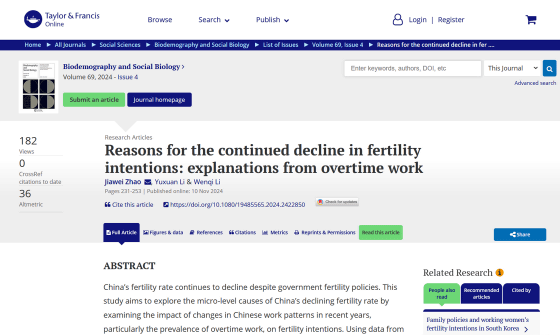Overtime work culture may be undermining efforts to boost birth rates

In most developed countries, declining birth rates and the resulting low birth rate and aging population are major issues, and although governments have put forward policies to increase birth rates, no noticeable effects such as a significant increase in birth rates have been seen. A study conducted in
Reasons for the continued decline in fertility intentions: explanations from overtime work: Biodemography and Social Biology: Vol 69 , No 4 - Get Access
https://www.tandfonline.com/doi/full/10.1080/19485565.2024.2422850

A demanding work culture could be quietly undermining efforts to raise birth rates
https://www.psypost.org/a-demanding-work-culture-could-be-quietly-undermining-efforts-to-raise-birth-rates/
Facing a population explosion in the second half of the 20th century, China implemented a one-child policy that limited each couple to one child from 1979 to 2014. This policy succeeded in curbing population growth, but the country now faces a rapid decline in the birthrate and an aging population. As a result, the Chinese government has been working to increase the birth rate by abolishing the one-child policy and providing subsidies to households with many children.
However, these birth rate-raising policies have only had limited success, and China's population is expected to continue to decline in the future. Economic circumstances and rising housing costs are often cited as reasons why Chinese people are losing interest in having children, but a research team from Nankai University and Henan University of Technology in China conducted a study on the possibility that 'lack of time due to long working hours' may also be a cause.
The research team used data from the China Family Tracking Survey (CFPS) , a large-scale survey of more than 20,000 people across the country conducted in 2020. The CFPS collected detailed information on demographics, employment status, income, health, and family life, including workers' reported 'weekly work hours' and 'types of overtime work,' as well as 'intent to have children within the next two years.'

In the study, people who worked more than 40 hours a week were classified as 'working overtime' based on
The analysis found that working overtime had a strong, statistically significant negative effect on the desire to have children. This pattern held true in almost every region analyzed: the more hours people worked beyond the standard 40-hour week, the less likely they were to report planning to have children within the next two years.
This trend was particularly pronounced among people working 40-50 hours a week, with the desire to have children dropping sharply once work hours exceeded 40 hours. On the other hand, people working more than 60 hours a week showed more varied responses, but overall their desire to have children also declined. Those who worked 0-20 hours a week were most willing to have children.
The study also showed that the type of overtime work was important: those who regularly worked weekends or nights, or who had to respond to emergency calls 24/7, were significantly less likely to want to have children. These types of work patterns disrupt daily routines, reduce time spent with partners and families, and make it harder to disconnect from work even outside of working hours, which can lead to chronic fatigue.

The negative impact of overtime on the desire to have children was stronger for women than for men. This suggests that long working hours may place a particularly strong burden on women, as they tend to take on more housework and childcare than men. Additionally, the negative impact of overtime was stronger on unmarried people than on married people, which is thought to be because, as unmarried people, it is easier for them to make the decision of whether or not to have children on their own will.
When we looked at whether certain work environments could mitigate work-family conflict, we found that flexible working arrangements, which allow employees to choose when they start and finish work, have a positive effect on the desire to have children. Another important factor is maternity insurance, as these benefits may ease the financial and psychological burden of childbirth.
Related Posts:
in Science, Posted by log1h_ik







